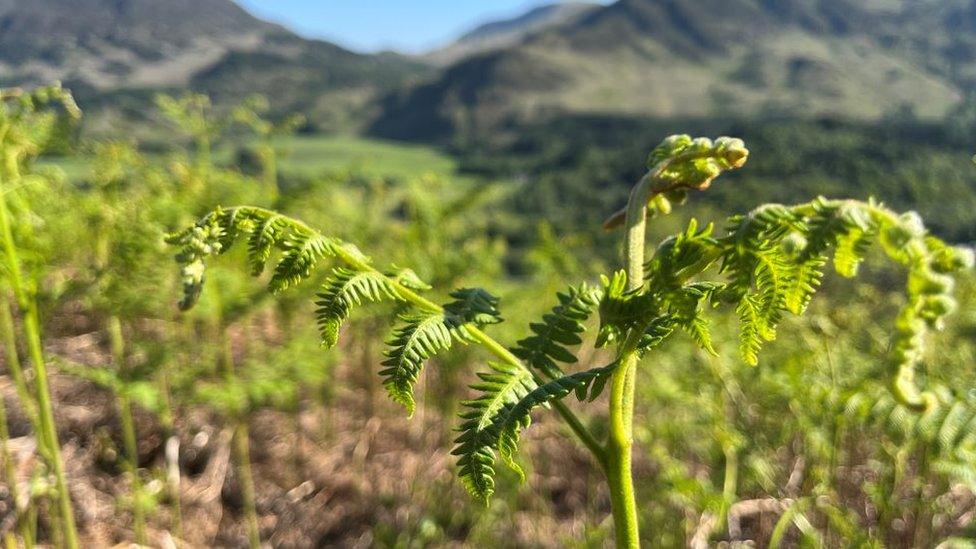Farmers denied emergency use of banned chemical for bracken control
- Published

Bracken is a poisonous plant to most animals so sheep don't touch it
Farmers have been denied emergency access to a banned chemical to control bracken growth in Scotland.
For the last 10 years, Asulam has been granted special approval to be sprayed from helicopters to treat bracken that could overpower hillsides.
The Scottish government now say that the risks to the environment and human health outweigh the potential benefits.
Farmers who want to use Asulam claim that sheep-grazing areas would become wasteland without treatment.
Use of the chemical, which was banned in 2011, relies on an emergency approval being granted each year by ministers.
On Wednesday the Scottish government said that, for the first time, the Health and Safety Executive (HSE) had recommended refusing its use in 2023 to all four UK nations.
It said the HSE considers use of the herbicide "does not meet the legislative requirements for emergency authorisation".

Asulam has been used to treat bracken in Scotland for the last 10 years
Scottish ministers have agreed to this recommendation. The same decision has been taken in Wales.
However, emergency approval for its use has been given in England.
Asulam - which is sold under the brand name Asulox - was banned by the EU because of concerns it could be an endocrine disruptor which can interfere with the body's hormones.
'Biodiversity loss'
Martin Kennedy, president of the National Farmers' Union of Scotland, said: "It is a shocking decision as far as we are concerned, it should be looked at immediately again.
"The reality is the Green agenda pushing something that is going to cause biodiversity loss, and a monoculture of bracken that's going to be across the country that has a big effect on rural communities."
Rural Affairs Secretary Mairi Gougeon said the Scottish government was aware of the risks associated with uncontrolled bracken and had based the position on scientific evidence.
She said: "The Health and Safety Executive advice to all four nations of the UK was not to authorise the use of Asulox because of the risks it poses human, animal and environmental health.
"Independent advice from the Chief Scientific Adviser and the Expert Committee on Pesticides supported this conclusion, and the Welsh government have confirmed that they too will follow the HSE advice."
Support for farmers
Campaigners who are against the use of dangerous chemicals say there is a risk Asulam can cause cancer and that alternative control measures should be used instead.
However farmers claim those alternatives, like using cutting equipment or allowing cattle to trample the bracken, are often unworkable because of the terrain.
Although bracken is not a food product, the worry comes from the spray drifting on to crops or entering watercourses.
There is no direct evidence about Asulam's link to cancer and further research is ongoing.
Scottish Conservative rural affairs spokeswoman Rachael Hamilton said: "This is a hugely disappointing decision and one that will have major ramifications for rural livelihoods and for public health.
"I have repeatedly called on the SNP-Green government to approve the emergency use of asulox to give our farmers and land managers the most effective tool to control bracken, and stop the spread of ticks which cause lyme disease.
"Instead, it looks as though once again the SNP-Green government have ignored the needs of our rural and remote communities. Their calls for approval have shamefully fallen on deaf ears."
This article was amended on 23 June 2023 to make clear that the reason access to Asulam had not been approved was that the risks outweighed the benefits.
Related topics
- Published2 June 2023
